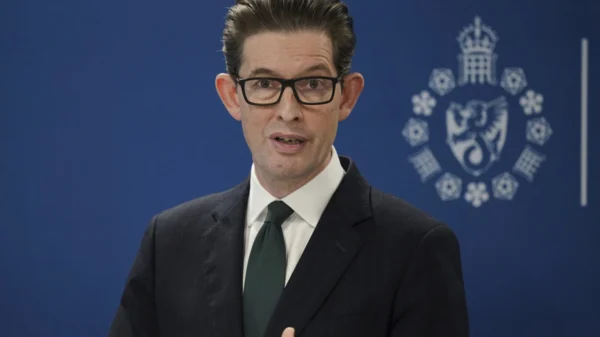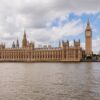Staff writer Fred Taylor addresses the political impermanence of Labour Party policies under leader Keir Starmer.
It is only nine years since Sir Keir Starmer left his career in law to become a politician. During that time, the Labour MP from Southwark has proven himself to be a level-headed and capable politician who ticks almost all of the boxes. Instead of being frightened by the often contradictory qualities people expect in politicians, Sir Keir has near-perfectly ridden the balance between opposing demands on his leadership.
For instance, people want politicians to be ‘common people’ who are just like them, but they also demand that they have extraordinary charisma and intelligence. Keir Starmer meets both of these requirements. He is always keen to remind the public of his humble beginnings, being the son of a toolworker and a nurse and the first in his family to graduate from university. He is also a man of outstanding intelligence, with a brilliant academic track record, a degree from Oxford University and a professional career in law which culminated in him being appointed Director of Public Prosecutions.
We want powerful, confident leaders, but we are weary of politicians who present themselves as infallible and are overly zealous in their ambition. Unlike Boris Johnson – who went too far one way on this scale when attempting to lie his way out of allegations of partying during the lockdown – Sir Keir has handled his aporia with grace. He quickly stated that he would resign if the police handed him a Fixed-Penalty Notice (FPN), but consistently and confidently maintained his innocence. Integrity and honesty is a potent political mix.
Yet we also want a leader who has a bold vision but, at the same time, will respond pragmatically to public opinion. This is Keir Starmer’s Achilles’ heel.
If the previous Labour leadership suffered from having ‘too much vision’ by proposing specific plans that would have radically overhauled our economic structure, the current one is suffering from having too little. Three years into Keir Starmer’s leadership, successfully predicting what he will bring to the table if he gets elected feels like finding a needle in a haystack. While being a chameleon is an asset every politician can profit from on some issues, using it too much gives away your cover. Instead of seamlessly shapeshifting in order to fit your surroundings, you look like a desperate fool endlessly pursuing public gratification. We now have various instances of him blatantly switching sides, and people have stopped giving him the benefit of doubt when he does so.
The first illustration of this are the notorious, and perhaps now infamous, ‘ten pledges’. The proposals, which still appear on his website, are based on a “moral case for socialism”, an ideology he no longer appears to fully support, and include a plethora of now renounced commitments. These include a promise to abolish tuition fees, which he has now refused to support; an assurance that he would stand with trade unions, which was emblematically disavowed when he controversially banned frontbenchers from attending picket lines, and, most famously, his repudiation of the ‘common ownership’ pledge. By the start of 2022, quotes such as “the top-down version of nationalisation, I don’t think really works and I’m not in favour of that” were already coming out of his mouth.
But these isolated incidents would have been comprehensible. His aim was to win over the votes of a very left wing Labour membership and he was then confronted with the problem of having to market these ideas to the broader public. This understandably leads to some pledges being shed, and it is important to note that he has complied with many of the original promises: he has followed through on his pledge to promote human rights and peace around the world. He criticised Boris Johnson for supplying arms to Saudi Arabia and has strongly supported the Ukranian plight for peace and justice. He has also convincingly performed on climate justice, the third pledge, through calling for a nationally-owned energy provider to champion non-polluting green energy.
But the overall picture is still not favourable. Hs real can of worms is that he did not flip-flop just once, but has done it continuously throughout his administration of the party. Instead of putting forth convincing arguments on the solutions to the many problems that the British public faces, he trails public opinion and waits to see what the Conservative Party will do before taking any action, allowing for people to first make their mind up on issues before intervening.
A perfect example of this was when Liz Truss put forward her disastrous tax plans. Instead of outrightly opposing the preposterous proposals promptly, he waited for the public reaction. While he opposed the tax cuts to the rich (the elimination of the corporation tax hike and the 45p rate. reduction), he actually supported the cut to the basic rate, which he thought was politically convenient at the time. A classic Starmer hedge. This was despite the fact that Britain was facing an enormous black hole in the upcoming budget and what we needed more than anything was more funds for the Treasury, not less. Since he did not take a strong stance immediately, Starmer cannot truly say that he fully opposed Truss’ plans.
The thinking behind this is that once people have decided what they want, the Labour Party can wave a banner reaffirming that position and win easy votes. However, as shown by the example above, this fails in the long term as it undermines the ability of candidates to both present themselves as principled and to assert that, if they had been in power, a positive counterfactual would have occurred. Moreover, doubts emerge over whether the politician swears by the policy he is proposing.
Historical examples of this are numerous. For instance, John Kerry was lambasted during the 2004 election after trying to present himself as more interventionist on foreign policy issues, despite his anti-interventionist past. Ed Miliband failed to convince the public that the Labour Party had changed on issues of immigration. While a memo leak and a ‘controls on immigration’ mug gaffe certainly did not help the ex-Labour leader, the underlying issue was that the public saw right through the U-turn. The 2015 election saw many traditional Labour voters switching to UKIP. They sympathised with Labour’s policy, but simply did not trust that those in power would carry it out. Kerry and Miliband simply floundered hopelessly around on the centre ground. It is often very difficult to ride the wave of public opinion, and politicians’ attempts to do so often result in both sides hating them.
For instance, Keir Starmer has shown his true flip-flopping colours most ostentatiously with the issue of transgender rights. In 2021 he was committed to introducing self-identification and proclaimed in strong words that he absolutely stood with trans people. But as public opinion started to change and the issue became more controversial, he tried to camouflage into a gender critic and now says he has “concerns” about the Gender Recognition Act (GRA) that just passed Scottish Parliament. The result: those on the gender critical side of the debate see him as the pro-GRA man he was in 2021, while many trans activists seem him as a traitor to the trans community.
Again, if these were isolated incidents, it would not be the end of the world. Flip flopping on certain issues is a technique that almost all politicians have used during the careers, but to do so with such frequency and gusto is something special: Brexit, socialism, tax hikes, Israel-Palestine and immigration are all major issues on which Starmer has shifted his stance over the last three years. He has become typecast as a man with no principles – someone who, in Boris Johnson’s words, has “more flip flops than Bournemouth beach” . According to a recent poll, some of the words people associate most with the Labour leader include “weak”, “useless”, “untrustworthy” and “unsure”. People also think he is “boring” and “bland” – his lack of a clear and invigorating vision is taking a heavy toll on his public image.
There have been a few instances where Keir Starmer has attempted to provide said vision, the three most notable examples being the ‘non-dom’ tax changes, the proposal for a windfall tax and the idea of a state-owned energy company. However, this is not enough to go on.
The first idea, getting rid of the ‘non-dom’ tax break, is a good one. 51% of people are in favour of scrapping the ‘non domiciled’ status, which allows residents in the UK to not pay the full rate of tax for income earned in the UK. Only 20% oppose it. Despite the argument that it would scare the ‘financially fortunate’, such as Rishi Sunak’s wife, away from the UK, there is solid evidence it would produce a net increase of £3.2 billion a year in revenue, even after accounting for the loss in revenue of those who would leave the UK. The windfall tax on energy companies was also a popular and effective plan, so much so that the Tories adopted a slightly watered-down version of it. Nonetheless, the tax will only raise around £6 billion a year.
The combined effect of these two policies would be an extra £9 billion for the revenue, in other words, an increase of less than 1% in public funding. It’s not exactly an epiphany.
The ‘Great British Energy’ idea could, however, be described as such. It is a popular idea that ticks all the boxes. Labour has realised that high energy prices are a burden that the people are tired of having to deal with. They also noticed that we depend too much on foreign powers for energy and that there is a climate crisis to which we are not adequately responding. As such, they came up with a clear and effective plan. ‘Invest in green, British energy, free of corrupt foreign interests or greedy private energy companies’, they argue. Keir Starmer’s announcement of the policy at conference resonated with the public, leading to a substantial increase in his approval ratings. Despite this, this idea has disappeared from Labour’s messaging and has barely been further developed. The only element of vision that they had in the works has been abandoned.
The fact is that the country is dealing with choppy waters, and Sir Keir needs to prove to us that he is the one who can steer the ship back to safety. Simply showing that he won’t send the ship down the impending waterfall is not enough. Keir Starmer has warned Labour Party officials about resting on their laurels, and has said that they should treat the Labour Party as if it is still down in the polls. However, the last thing a party that is down on the polls should do is be mundane and boring. The truth is, there are many justifications for a party with a substantial lead in pubic opinion doing precisely the opposite of what Sir Keir is currently doing.
Despite the Labour Party’s wide margin in the polls, their support is often very shallow, and it does not translate to Starmer’s personal approval ratings, which are currently at -5%. Tony Blair, a man with a much clearer vision who was in a similar situation to Starmer, had polls showing a greater than 20% positive personal approval rating in the run up to the 1997 election. If he wants to build strong and exhilarating support, he needs to propose more invigorating ideas than he currently is. At the moment, people are opting Labour out of desperation, not out of passion.
For now, Keir Starmer is at the whim of events and Sunak. If his opponent somehow gets out of the political and economic mess he has inherited, then Keir Starmer may see the tide start to change, and more people may turn to the “clever and capable” Prime Minister. This is not only scary for Starmer’s future, but is also stopping him gaining even more ground.
For instance, with Nicola Sturgeon’s recent resignation, there are a plethora of ex-SNP supporters whose votes are for the taking. These voters already sit within a decidedly anti-Tory bloc and are looking for a change of government at the next UK election, but what factor would pull them towards the Labour Party?
If their memory is long enough, perhaps they will recall the promise of a Great British energy company made four months ago, or the House of Lords abolition plans made two months ago (although they have already been watered down), but most likely they will not. Scottish voters will only vote Labour if they are pushed away by an unpopular replacement for Sturgeon.
Finally, even if Keir Starmer concludes that the best way to win an election is through a pander-fest, then the question that arises is “what is the point of winning an election?” Thatcher, Cameron, Blair and Boris Johnson all had clear and specific things that they wanted to accomplish when in office – their motivations for being in power were obvious. The same cannot be said for Starmer. He is the 70% favourite to be the next Prime Minister, but I am still sat wondering why he wants the job. When one is ahead by so much in the polls, they can start to take risks and propose ambitious plans with the assurance that there is still a very good chance that they will win the election.
It seems like Keir Starmer is understandably scared of falling into the same traps that his predecessor fell into. After all, the Tories’ strongest attack against him is the fact that, a mere three years ago, his party was not a credible opposition and was instead “a glorified protest movement”, as Tony Blair put it. However, he should not let that stop him from having bold plans to put our country back on track. He simply needs to ensure that he does not make the mistakes Labour made in the run-up to the 2019 election – namely, producing radically out-of-touch and unbudgeted spending plans.
On top of this, people often confuse pragmatism and boldness, believing that the two values are at odds with each other, when they can clearly co-exist. For instance, the NHS is suffering from a crisis that it will still be in by the next election. Yet Labour’s plan for the NHS is vague, mentioning reform but giving no detail about how they will achieve it. It is not inspiring and brings nothing new to the table. A purely pragmatic approach would be to identify clear and concise ways the NHS’ structure can be improved, how it can respond better to patients needs, and in doing so, it would not reference ideology (a difficult task in a deeply ideological area of politics). Pragmatism involves focusing policy around what provides the best solutions to the problems the country faces. Contrastingly, the vague approach which Starmer has adopted, underlined by his frequent U-turns, takes the easy way out: it avoids proper policy-making by providing all-encompassing, bland slogans that coincide with as many people’s values as possible, but fails to provide any substantive solutions.
Desperate to avoid the hot seat, Keir Starmer is playing a political game of musical chairs – as the music plays on, the number of chairs starts to dwindle and his moves become blatantly obvious. The Leader of the Opposition has a real chance to grab the bull by its horns and show us his path for a much needed better future. He can allow Labour to stay as the ‘default’ party, or can elevate it to the prized choice, a party with a clear vision and which is synonymous with ambition and opportunity. The ball is in his court.


















